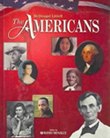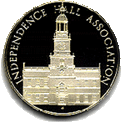- Unit 1A: The Civil War
- Unit 1B: Reconstruction
- Unit 2: Westward Expansion and Populism
- Textbook
- Period 2 Table of Contents
- Period 3 Table of Contents
- Period 5 Table of Contents
- Period 6 Table of Contents
US History
Thanks for visiting the US History Page. Here you will find information, links, activities, tools, handouts, and objectives for each unit in US History..
This site will continue to grow as I add new things, discover new links, and create items that will be useful for learning United States History from the Civil War to the modern day.
On the left are links to each unit. Each unit will include content that we utilized in class and will give you the opportunity to either catch up, get ahead, or provide some enrichment for what we have already done. at the top of the list is the "Table of Contents." This is the online version of the Table of Contents in the classroom and provides links to each of the pages in your binder. This will be a very useful page; if ever you are absent, lost a page that belongs in your binder, or found a page and are not sure where it belongs, use this link.
On the right is an important section.
On each page it will include handouts associated with each unit. It will include both things we will use and things we will not. Which we use will be determined by what I think each class needs. I will be doing my best to keep the list updated as we go along.
What Is US History?
Sounds pretty obvious, “the history of the United States.” I guess that description is valid, but could use a little clarification. First, it is a continuation of the US History learned in Florida's curriculum for 8th grade. We will begin with the Civil War and continue to present day. What is important to understand is the course is not merely history, but is also skills - the skills necessary to pass the End of Course (EOC) test at the end of the year.
While the curriculum is broad, the important thing is that the student learns the important skills that will translate beyond the History curriculum and will be used in everyday life. I know we are not living in the past, so sometimes history seems like something that should be more of a hobby for people who get excited about that kind of thing. The truth is, without knowing the beginning of the story it is difficult to understand the part of the story we live in. For example, if you have ever walked in on the middle of a movie or began watching a TV series from the eighth episode, there are a lot of questions about the events and characters we need answered before we can fully understand what we are currently watching. US History gives you the back story of where we are today.
To make the course more relateable, we will make connections from today to the past. In this way the history will seem less abstract and more real. We will see the ways history repeats itself, and if we can relate to the history, to the people living in that history, it becomes more personal; we will sympathize more than empathize, we will feel like we are living it, because in some ways, we are.
Through twelve units, we will learn about American History from the Civil War through present day. We will be focusing on key events, people, concepts, and patterns, building on American History that you have learned in previous grades through Middle School and the little bit covered in World History. The focus of US History is to put it all together to learn how we got to where we are now and understand the ideas behind policies and events taking place in the broader world today.
In this course, I expect each of you to be responsible for your education and learning. In order to best prepare you for all the possible topics on which you will be tested, this course will be taught strictly according to the Florida Standards for Social Studies. You must think broadly about subjects we discuss and be able to apply what you know and learn to different situations because the EOC will be about the application of the broad ideas, not necessarily about the specific examples we will use in the class to explain them.
Remember, this is NOT the class for the passive or lazy, you get out what you put in. This is your education; take an ACTIVE part in it. I hope that this semester will make the world around you become more relevant instead of simply a series of abstract ideas and concepts.
Online Textbooks
The online textbook can be accessed online through Clever. It includes the text as well as interactive materials that are referenced in the hard copy of the textbook, including videos, maps, and charts.
 |
"The Americans" TextbookEach page will also include links to the Americans textbook. While this is not the textbook utilized by this class, it contains useful information as any textbook would. From time to time I will include activities from this resource. |
|
USHistory.org Free Online TextbookEach page will include links to USHistory.org free online "textbook". The website has plenty of resources and links relating to American History, but the online textbook should be used as a supplement to our textbook and in class discussions. |
 |
|
 |
Digital HistoryThere will also be a link to University of Houston: Digital History.. This is a nice supplemental site with additional information to enrich your understanding of the topics. |
|
Podcasts
Podcasts can be an engaging form of information that can supplement what you learn in class. I will include episodes to podcasts I have heard and enjoyed that I believe you could benefit from or that you will find interesting related to each topic.
My favorite US History/History Podcasts include:
History This Week |
American History Tellers |